On Tuesday 22 September Zhong Lun Law Firm and Valueplus Consulting – in collaboration with the Australian Chamber of Commerce (AustCham) South China, the BritCham Chamber of Commerce (BritCham) Guangdong, and the Guangzhou Association of Enterprises with Foreign Investment – organised a seminar at Zhong Lun’s Shenzhen office on China employment and visa issues throughout and beyond COVID-19.
上周二(9月22日)中伦律师事务所和柏城睿智咨询公司,联同澳大利亚商会华南分会(AustCham),广东英国商会(BritCham)及广州外商企投资企业协会,于中伦深圳分所组织了关于新冠疫情前后的中国就业和签证问题的研讨会。
Kenneth Lam, Board Director of AustCham South China, began by welcoming the seminar participants and introducing the speakers from Zhong Lun and Valueplus Consulting.
澳大利亚商会华南分会董事Kenneth Lam首先欢迎与会成员,并介绍了来自于中伦和柏城睿智咨询公司的主讲人。
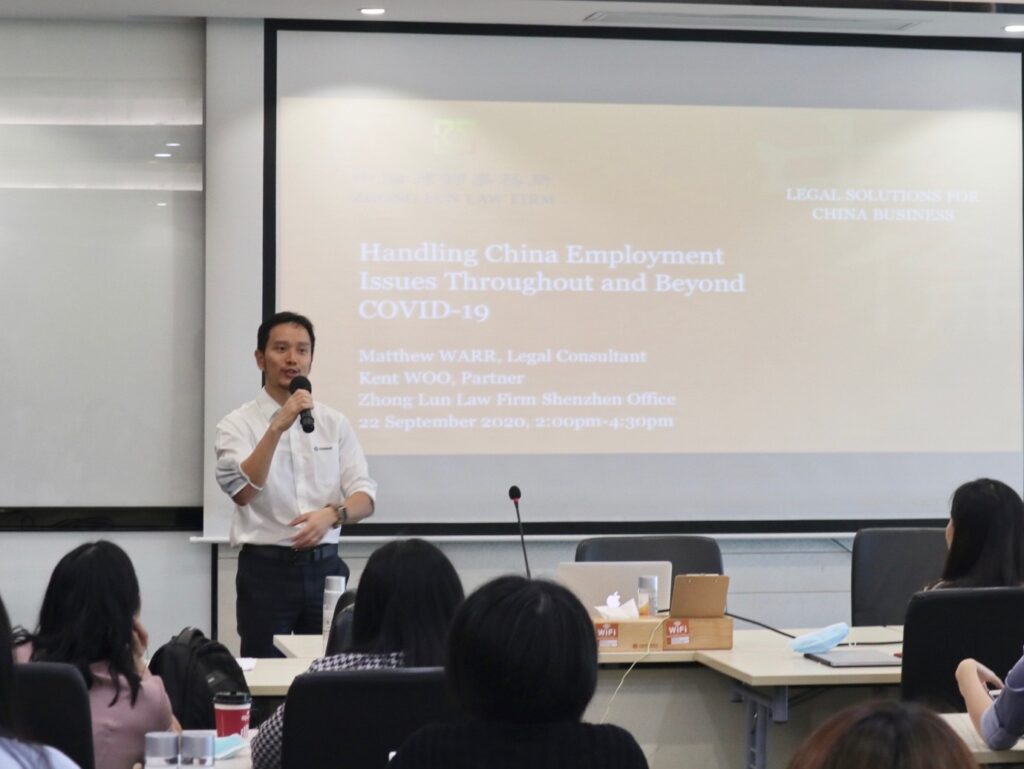
Matthew Warr, Legal Consultant at Zhong Lun Guangzhou, then took the stage and started his presentation by covering some basics about Chinese labour laws. Matthew then talked about employment of foreigners and work permits in China, focusing first on the legal obligations of foreigners switching employers and/or location of employment by using a real life case study. The case study involved a foreigner whose work permit was registered with the head office of their company in one city but who was working in their company’s office in another city, which is considered as illegal employment. He also covered the question of whether employers are permitted to keep their employees’ ID cards or work permits in their possession, with the short answer to this being that they cannot.
中伦广州法务顾问马啸(Matthew Warr)接着上台就中国劳动法基础知识的进行介绍。Matthew谈到了外籍人士在华就业及工作许可的问题,并首先通过一个现实生活案例,聚焦外国人跳槽和/或变更工作地点的法律义务。该案例案情主要为,一个外国人的工作许可注册在其公司总部的城市,但实际在另外一个城市的办公室工作。这被视为非法就业。他同样谈及用人单位是否可以持有保管其员工的身份证或工作许可证,而简单地说,是不可以的。
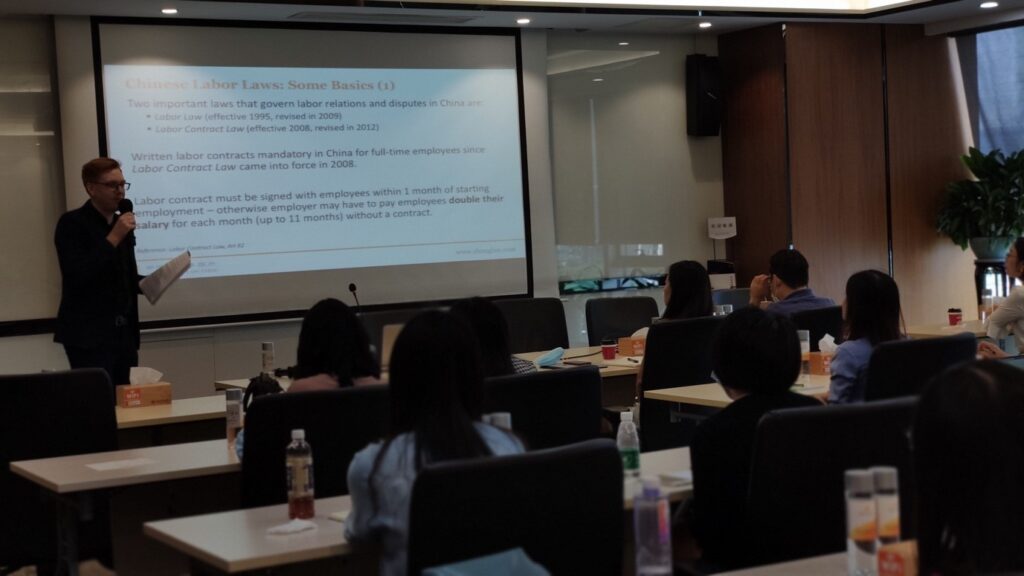
Matthew then discussed a very important and relevant issue: how to reduce labor costs due to COVID-19 without terminating employees. Some legal-based solutions to this include reducing employees’ working hours or adopting work shifts; arranging annual leave, welfare leave and compensatory leave; deferring salary payments; and taking advantage of exemptions from or reductions to social insurance and housing fund contributions. Furthermore, he explained that when an employer suspends production or operation for reasons not related to its employees, the employer may be entitled to reduce the employees’ salary to the minimum wage or a percentage thereof until production or operations resume.
Matthew然后讨论到一个重要且关切的问题:如何不解雇劳动者又减少新冠引起的劳动成本。部分法律措施包括减少劳动者工作时间或采取轮班;安排年假、福利休假和补假;延迟支付工资;利用社会保险免除或减少住房公积金的缴纳。此外,他也解释道,当用人单位非因劳动者缘故中止生产或经营,则用人单位可减少劳动者工资至最低工资或相应百分比直至生产或经营恢复。
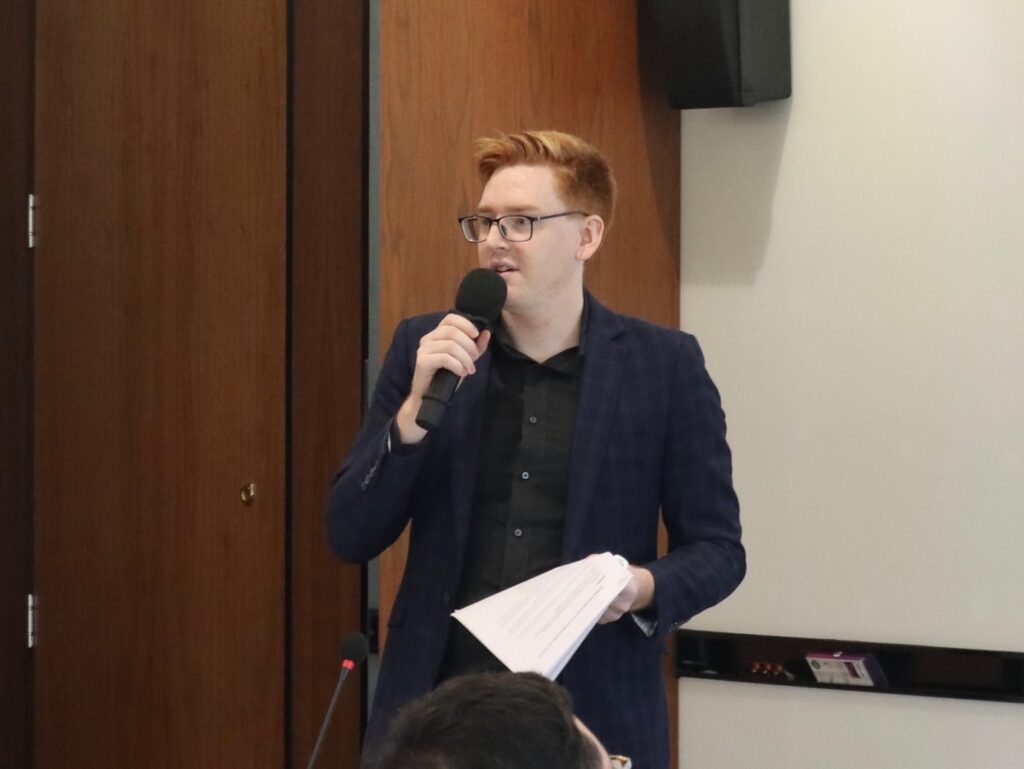
Following Matthew’s part of Zhong Lun’s presentation, Kent Woo, Partner at Zhong Lun Guangzhou, continued the presentation by covering labor contract termination – the last resort if the abovementioned labor cost reduction strategies fail or are not possible.
紧接着Matthew进行中伦部分的展示后,中伦广州合伙人吴清发(Kent Woo)继续就劳动合同的终止——上述减少劳动开支策略失败或行不通时的最后措施进行介绍。
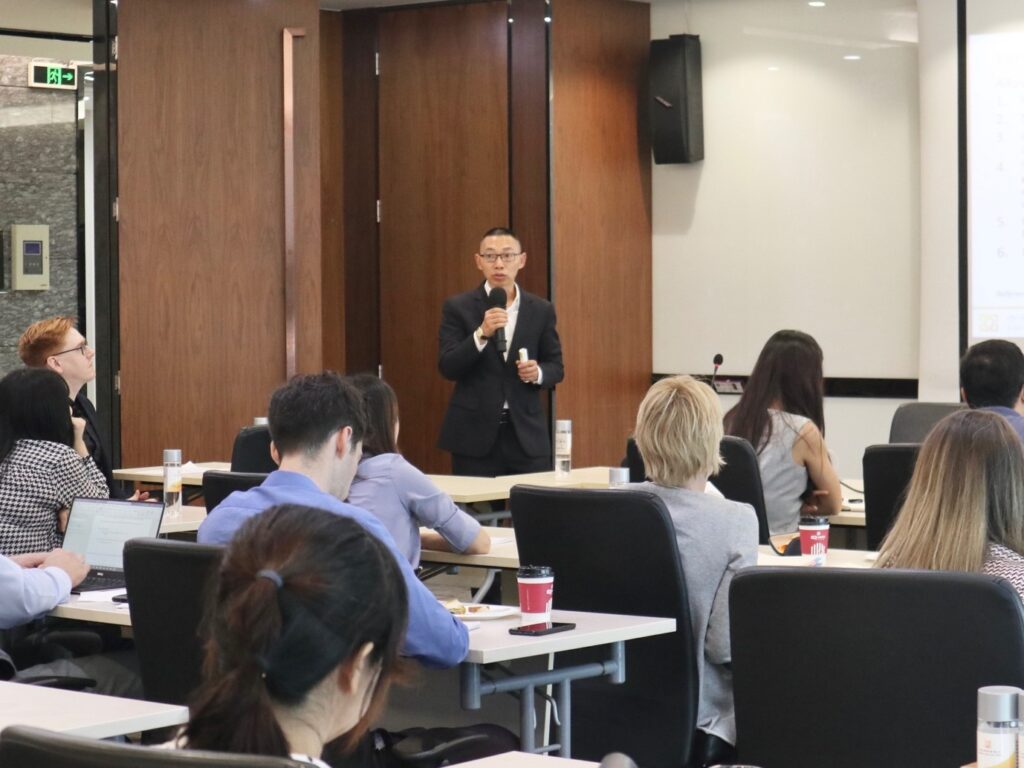
Kent first covered the six main reasons for which an employer can legally terminate employees without notice and severance pay. One of the most important of these reasons, he explained, is termination for “a material breach of the employer’s rules and regulations” (which should be contained within an employee handbook signed by employees when they begin their employment), such as for consistently turning up late for work, smoking in the bathrooms, and stealing items from the office etc., so long as the employer can prove in labor arbitration or court that it followed necessary procedures (e.g., sending warning letters) and that the breach was serious enough to support its actions. Through a practical case study, he demonstrated how an employee’s termination without notice and severance pay for lying about her sick leave (the employee in fact went travelling) was supported by the court as lawful termination without severance pay.
Kent首先介绍了用人单位在不作提前通知和支付补偿金的情况下,可以合法解雇劳动者的六种主要情形。他解释道,其中最重要的一种,是基于“实质性违反用人单位规章制度”的合同终止(这些规则应该在劳动关系开始时包含在由劳动者签署的员工手册里),例如持续迟到、在洗手间吸烟以及从办公室盗窃物品等,只要用人单位在劳动仲裁或法庭上证明已经经过必要程序(例如发送警告信)且该违规足够严重以支持其解雇的决定。通过一个实践案例研究,他展示了在不作通知和支付补偿金的情况下,解雇一名谎称病假的员工(该员工实际上去了旅游)是如何被法院支持,并被认定为无需支付补偿金的合法终止合同行为的。
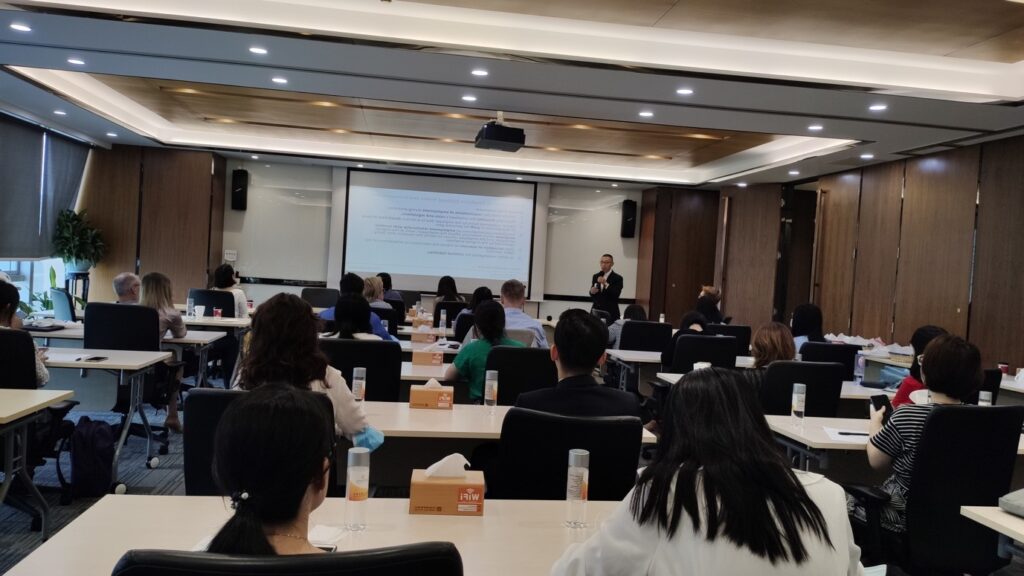
Kent then talked about the reasons for which an employer can legally terminate employees with notice and severance pay, including for suffering from an illness or non-work related injury, incompetency, and a major change in the objective circumstances relied upon at the time of conclusion of the labour contract.
Kent然后谈到了用人单位在有提前通知和支付补偿金的前提下,可以合法解雇劳动者的情况,包括非因工伤得病、不能胜任工作,和合同签订时所依赖的客观情况的重大情势变更。
Additionally, he covered mass lay-offs with notice and severance pay, employees protected from termination by the employer, employees prioritised for retention in mass-layoffs, and the reasons for which employees can terminate their labor contract and still be entitled to severance pay. Through another interesting case study, Kent demonstrated one such reason that employees can terminate their labor contract and still obtain severance pay: when the employer fails to pay the social insurance premium for employees. Other termination circumstances requiring severance pay, he explained, include mutually agreed termination but which is proposed by the employer, and when an employee’s fixed-term contract expires but the employer does not renew such contract, among other reasons.
此外,他谈到了大量提前通知和支付补偿金的解雇问题,用人单位提出终止合同下的劳动者保护,在大规模裁员中优先留用的劳动者,以及劳动者提出终止劳动合同但仍旧有权获得补偿金的情况。通过另一则有趣的案例研究,Kent介绍了其中一种劳动者提出终止劳动合同但仍旧获得补偿金的情况:当用人单位未为劳动者支付社会保险费。他解释道,还有需要支付补偿金的情况是,由用人单位提出的基于双方同意的合同解除,以及当劳动者的固定期限劳动合同到期但用人单位未续签该合同,等等。
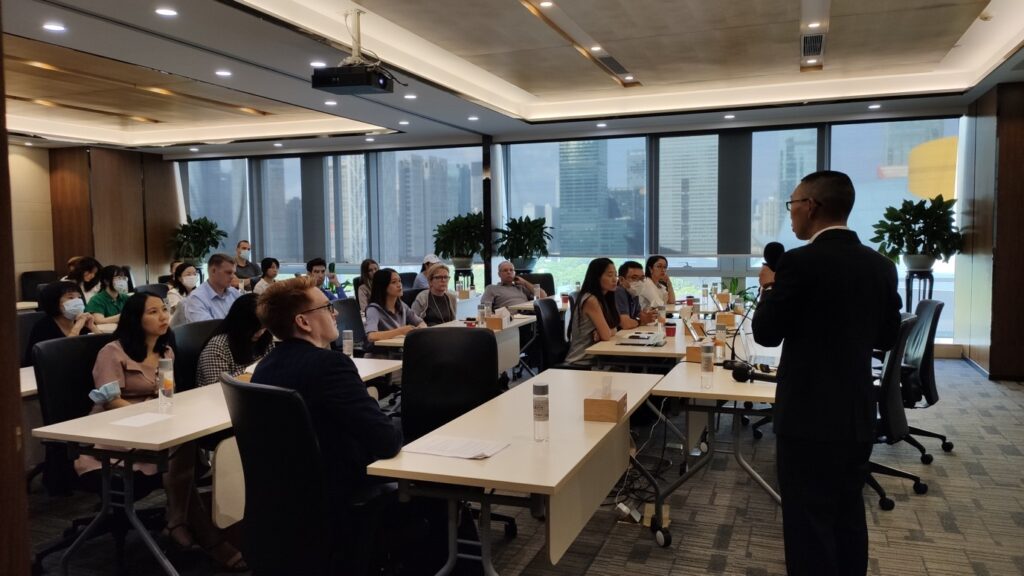
Kent then discussed how to calculate severance and compensation payment for terminations under different scenarios with cause (i.e., some of the reasons mentioned above) and without cause (i.e., for unjustifiable reasons not stipulated in the law). He concluded the presentation with some final tips.
Kent然后讨论了在有原因的情况下(例如上述提到的一些原因)和无原因情况下(例如法律未规定的非法原因)终止合同关系如何计算补偿金和赔偿金。他最后给出了一些建议结束展示。
Following Zhong Lun’s presentation on China employment issues, Betty Zhang, Founder and General Manager of Valueplus Consulting, took the stage to talk about visa issues in light of the current ban on the entry of foreign nationals into China after 28 March.
在中伦关于中国就业问题的展示后,柏城睿智咨询公司的创始人和总经理张璠(Betty Zhang)上台介绍在3月28日后中国限制外籍人士入境下的签证问题。
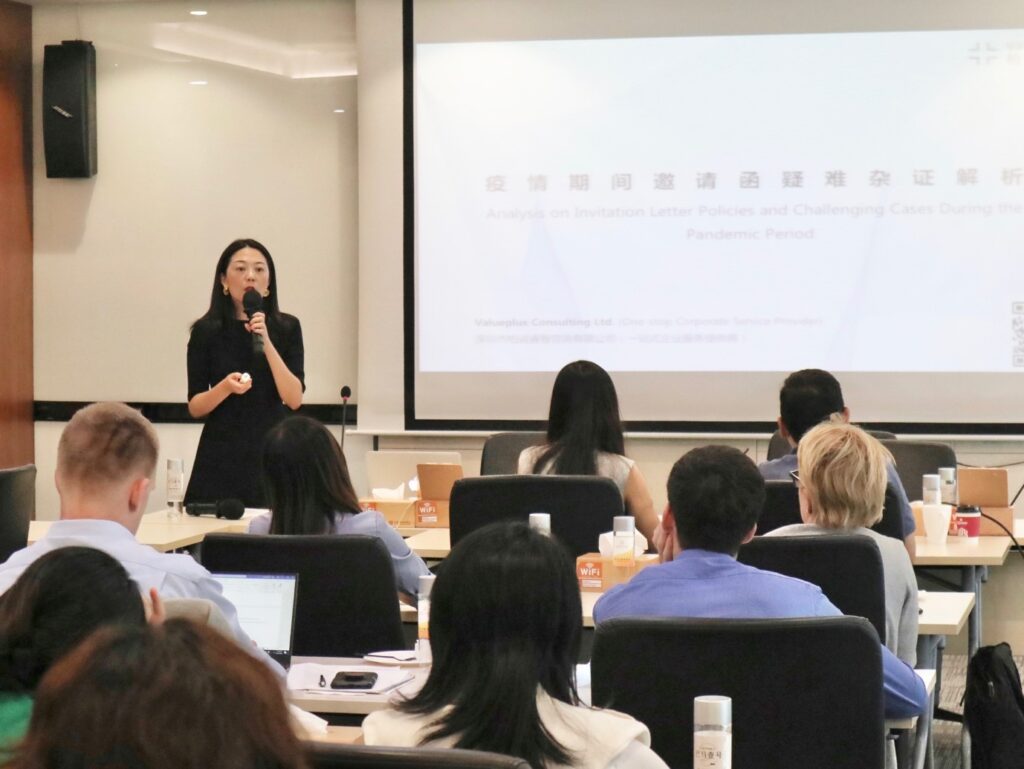
Betty explained and analyzed the up-to-date visa and entry policies in a practical manner by using three typical and successful Invitation Letter (PU Letter) and New Visa application cases. By sharing her successful experiences in handling PU Letters for executives, businesspeople, professionals and their family members from all over the world, she offered solutions to the five major issues/questions that foreign nationals who are seeking to return to China care about the most, such as “Who is eligible to apply for a new visa without a PU letter to return to China?” and “Who is eligible for a PU letter to apply for a new visa to enter China?”
Betty通过三件典型的成功获得邀请函(PU Letter)及新签证申请的案例,实践性地介绍并分析了最新的签证及准入政策。通过分享为全球各地高管、商业人士、专业人士及其家属处理PU Letter的成功经验,就五项急需回华的外籍人士最关心的主要问题,她提供了解决措施。例如“谁有资格无需PU Letter即可申请新的签证回中国?”以及“谁有资格获得PU Letter以申请新的签证进入中国?”
Betty stressed that as foreign nationals with Chinese green cards are exempted from the entry ban and are free to enter China during the pandemic, it would be highly recommended for foreign nationals to apply for permanent residency in China if they are qualified. Some of Valueplus Consulting’s clients have already started the application for permanent residency as soon as they had re-entered China.
Betty 强调由于在疫情期间持有中国绿卡的外籍人士都免于禁令,可以自由入境,因此强烈建议符合条件的外籍人士申请中国永久居留权。部分柏城睿智咨询公司的客户已经在重新入境后立刻开始申请永久居留权。
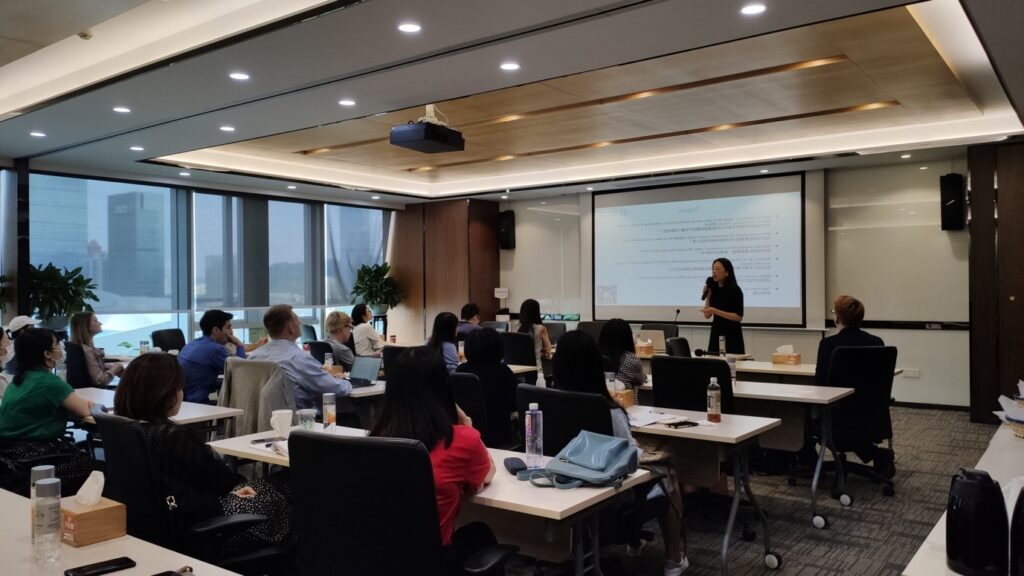
Betty also covered the current quarantine procedures and hotels in Guangdong Province. She strongly suggested that inbound travelers enter Mainland China directly instead of flying to Hong Kong and then entering Mainland China via Hong Kong to avoid having to do 14-day quarantine on both sides of the border twice. She shared with the audience the good news recently released by the Chinese government about the implementation of the 7+7/2+1 quarantine procedures.
Betty也谈及现行隔离程序和广东省内的酒店。她高度建议入境旅客直接入境中国大陆而非先飞到香港,再经香港进入中国大陆,以避免在两地进行两次14天隔离。她还与观众分享了最近中国政府发布的好消息,即7+7/2+1隔离程序的实行。
After the presentation by Zhong Lun and Valueplus Consulting, a lively Q&A session was held. During the Q&A session, the most frequently asked legal-related employment questions were in relation to the legal obligations of foreigners switching employers and/or location of employment, reducing employees’ salary to the minimum wage or a percentage thereof until production or operations resume, and legally terminating employees with cause. The most frequently asked visa-related questions by the audience were whether their executives or colleagues are eligible for a PU Letter, and new visa application procedures at different Chinese embassies/consulates all over the world. Zhong Lun and Valueplus Consulting offered professional solutions according to their actual situation. The seminar came to an end with food, drink and networking.
在中伦及柏城睿智咨询公司的展示后,开展了活跃的问答环节。在问答环节中,最经常被提及的法律相关就业问题是外籍人士跳槽和/或变更工作地点的法律义务、减少劳动者工资至最低工资或相应百分比直至恢复生产经营,以及在法定原因下合法解雇劳动者。观众最经常提及的签证相关问题是他们的高管或同事是否有资格申请PU Letter,以及中国驻世界各地大使馆或领事馆的新签证申请程序。中伦及柏城睿智咨询公司就其各自实际情况给出了专业的解决方案。最后,研讨会以茶歇和交流结束。
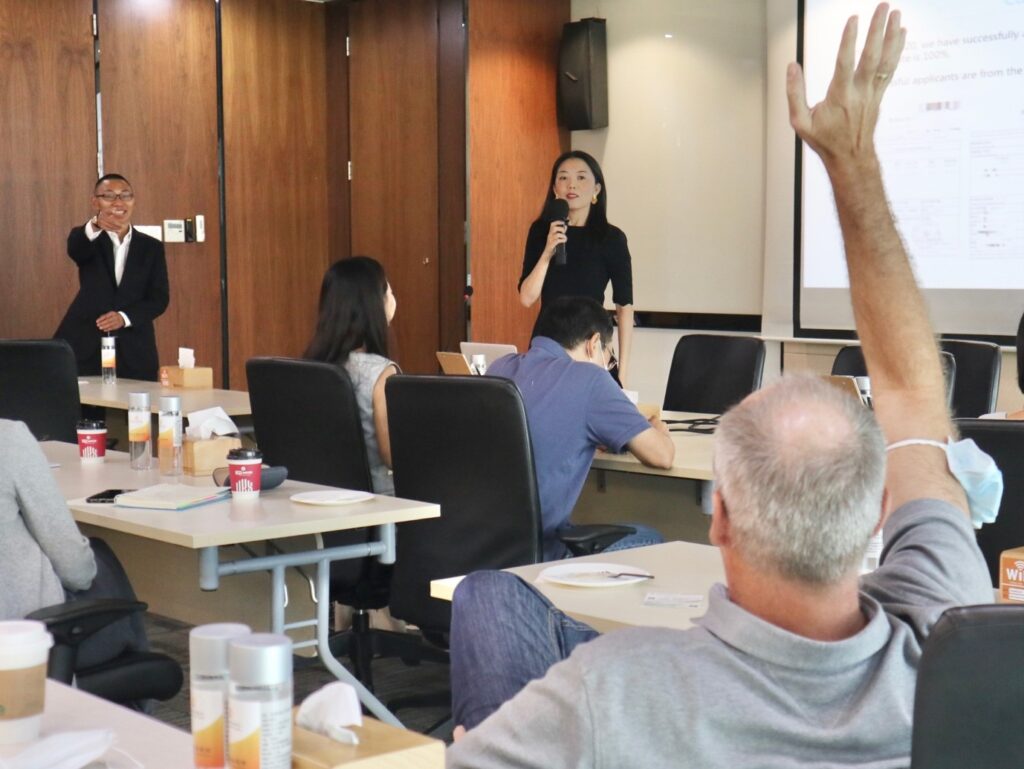


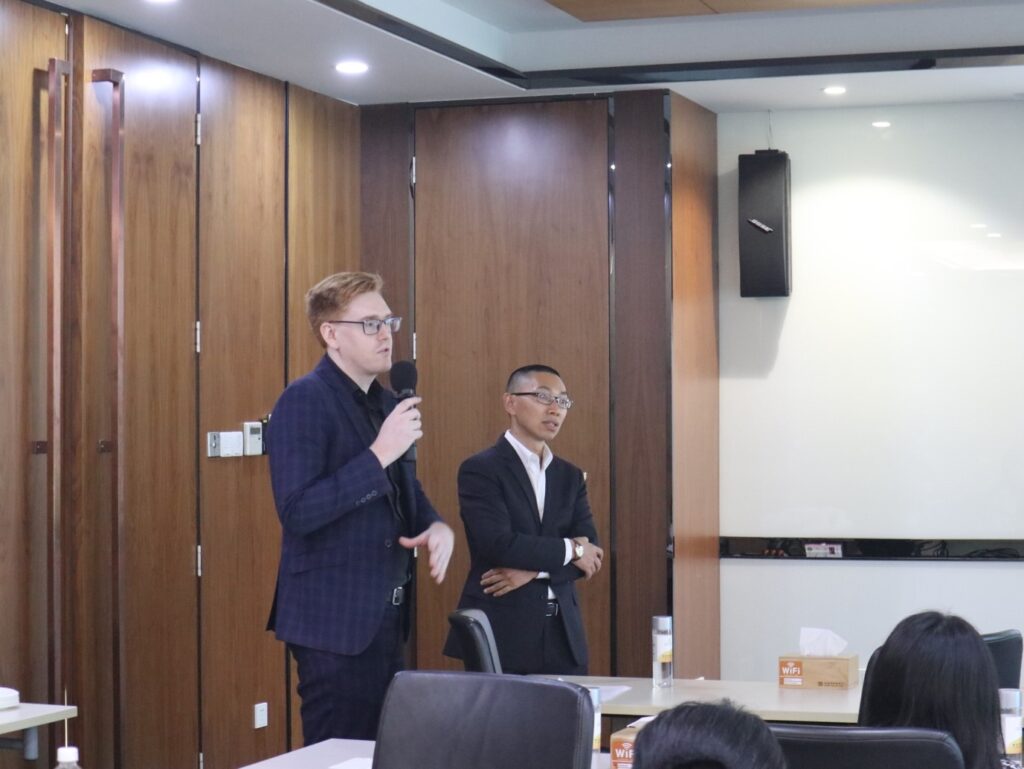
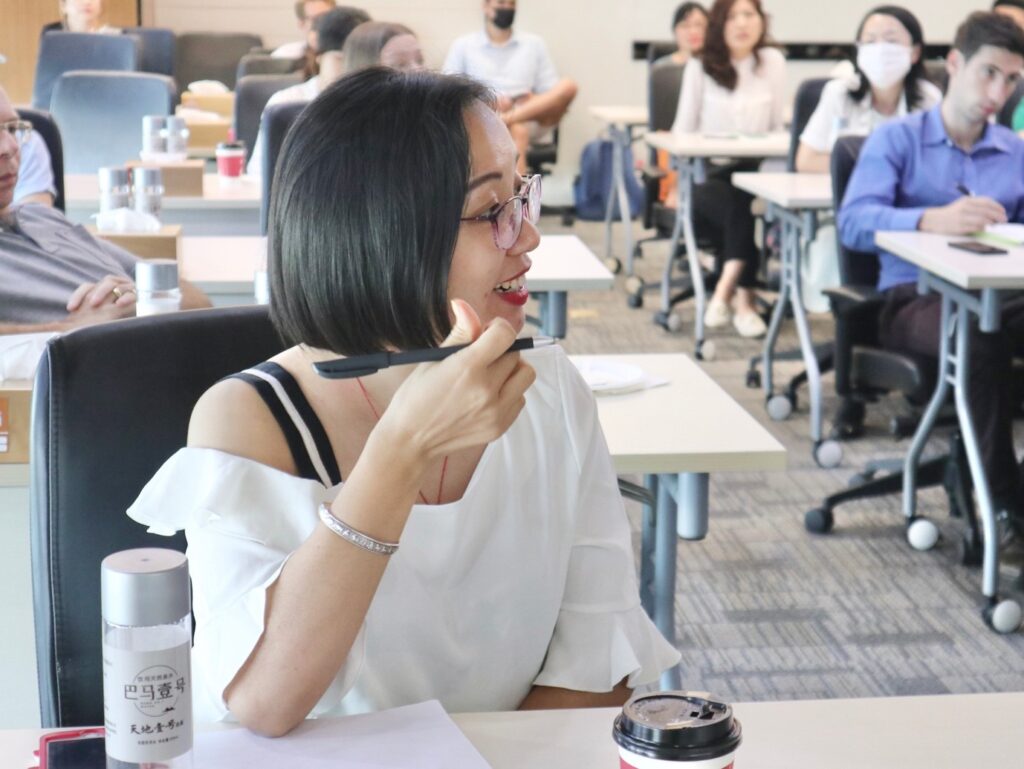
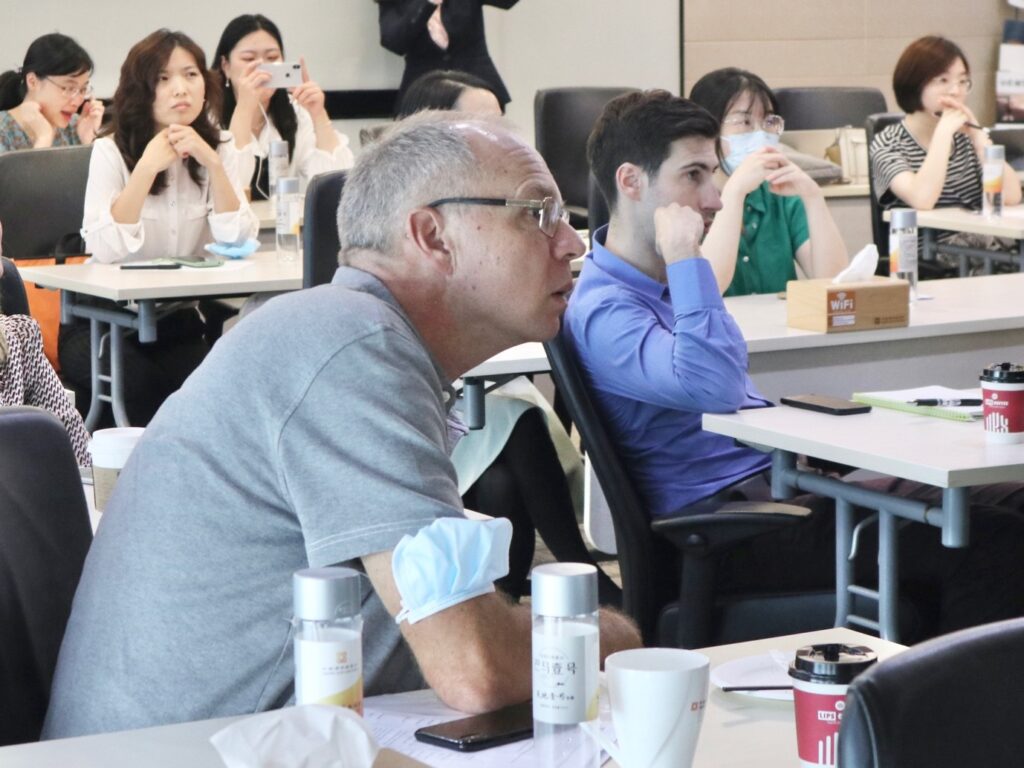

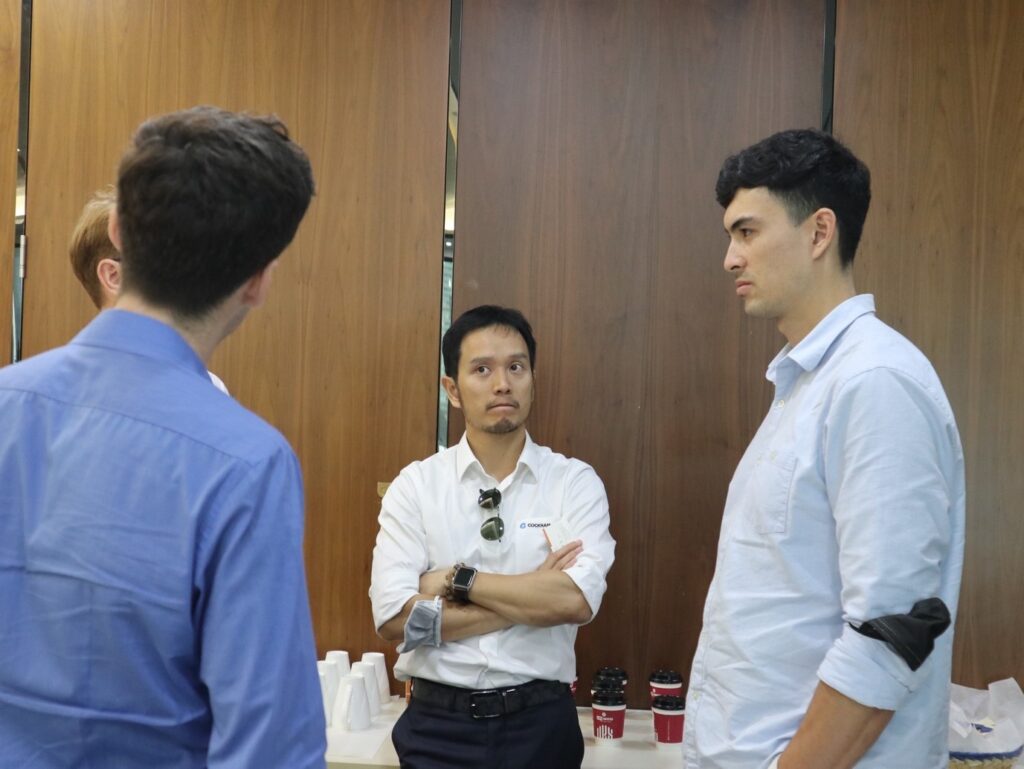
AustCham South China received lots of positive feedback and are looking to hold similar informative seminars in the future and continue bringing value to our members and the wider community.
澳大利亚商会华南分会收到了许多积极的反馈,并计划在将来举行类似的资讯研讨会,继续为我们的成员和更广阔的社区增值
Feel free to contact Matthew Warr at matthewwarr@zhonglun.com for any legal-related employment questions, or Daizy Kou at daizykou@valuepluscn.com for any visa-related questions.
更多法律相关就业问题请通过matthewwarr@zhonglun.com联络Matthew Warr,更多签证相关问题请通过daizykou@valuepluscn.com 联络Daizy Kou。


